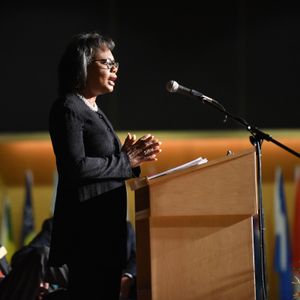Women’s rights icon Anita Hill decries ‘post-fact era’ in U of I address
Here's my full story from spokesman.com:
By Betsy Z. Russell
Women’s rights icon Anita Hill told a large crowd at the University of Idaho on Wednesday that the nation is moving into a “post-fact era” as the federal government stops collecting and posting critical data, from pay inequities to employment practices to sexual assault.
“I believe this is going to be an ongoing pattern,” Hill said, as she delivered the annual Bellwood Lecture to an audience of 570 on the Moscow, Idaho campus, citing figures scrubbed from the White House website, initiatives abruptly halted and more.
Hill rose to prominence in 1991 when she testified to the Senate Judiciary Committee about sexual harassment during the confirmation of U.S. Supreme Court Justice Clarence Thomas. The all-white, all-male panel was dubious of her claims, but the hearings galvanized the nation, leading to a major increase in filing of workplace sexual harassment claims and the development of policies on harassment at both public and private workplaces across the country.
Hill said the senators back then weren’t interested in data or facts. One held up a copy of “The Exorcist” and suggested her testimony was pulled from fiction, “or that I was demonically possessed, or both.” Another said anyone who would do what she was describing must be some kind of monster, and a third suggested that Hill herself must be mentally ill and suffering from “erotomania.”
“What they did was what I call governmental malpractice,” Hill said. The committee failed to call upon experts, though many were available. They didn’t call corroborating witnesses, including people Hill didn’t know but who had similar experiences working with Thomas. “They all said, ‘We really don’t know anything about sexual harassment,’ but then they went on to rely on their own imagination about what sexual harassment was like,” she said.
The hearings, which Hill called a “cautionary tale with 21st century significance,” also saw senators from both parties declaring repeatedly that Thomas was innocent until proven guilty. But Hill, a law professor at Brandeis University, said that’s the standard for criminal cases – not for civil rights violations, which instead rely on a preponderance of evidence standard.
“All of this went on because the senators refused to look at evidence,” she said. “They refused to develop their policies and their investigation and their procedures based on the evidence. And that, I think, is just an indication of where we might be headed.”
She pointed to a case in the Silicon Valley in California where data showed that women in high tech were earning 29 percent less than their male counterparts, and a study that showed that starting pay in the biological sciences was in some cases half as much for women as for men. “We need to have a robust collection of that information,” Hill said.
“The existence of that data can improve our ability to actually address the government and challenge some of the policies that are being made,” Hill said – and she said at the federal level, it’s going away.
However, she said, “There is a silver lining, and that silver lining is us.”
She called on people in academia, in the law, and in the judiciary to collect, analyze and report their own data.
“It is on us,” Hill declared. “Collecting the data, understanding the true status of women and girls in this country is an imperative as far as I’m concerned. If we are in fact going to move forward, we have to measure where we are right now. If we are going to measure any progress, we have to have a baseline, and we have to collect data to be able to do that.”
That means universities must collect – and transparently expose – data about their own practices with regard to students, faculty and staff, she said, calling that “one of the things that we do not do very well.” Further, she called on people in academia, law and the courts to be “models of inclusion” in their own practices, and to engage with government to be advocates for all members of their communities.
“We cannot be shut out from equity simply because one branch of the government does not act to collect it for us,” Hill said. “We must pursue it in our research, in our scholarship, in our public engagement.”
Hill’s lecture drew multiple rounds of applause and a standing ovation from the crowd, which included hundreds of students along with UI President Chuck Staben, Idaho Supreme Court Chief Justice Roger Burdick and Idaho State Bar President Kent Higgins.
The lecture culminated two days of appearances that Hill made both on the Moscow campus and in Boise the previous day, where she addressed an enthusiastic crowd of more than 500 at a downtown hotel ballroom.
Burdick told Hill he had a vivid memory of watching her 1991 testimony on TV as a young magistrate judge in Jerome, Idaho. “I thank you for your courage,” he said.
Hill said she was honored to be selected for this year’s Bellwood Lecture, “in particular because Judge Bellwood was committed to legal education and the free exchange of ideas, and I truly appreciate the diversity of ideas and individuals and perspectives that you have brought to the University of Idaho – and I’m sure that the members of your community appreciate it as well.”
The Bellwood Lectures, endowed by longtime Idaho judge and UI graduate Sherman J. Bellwood, bring prominent and highly regarded leaders to the state of Idaho and the University of Idaho campus each year to give students the opportunity to discuss, examine and debate a wide range of subjects related to the justice system. Past speakers have included Chief Justice John Roberts; Kenneth Starr; Janet Reno; Antonin Scalia; and David Halberstam. It is the largest endowed lectureship at the University of Idaho.

